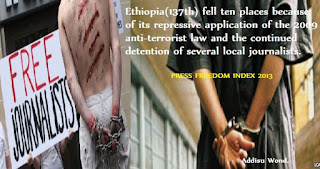Human Rights Watch World Report 2013
Ethiopia
The sudden death in August 2012 of Ethiopia’s long-serving and powerful prime minister, Meles Zenawi, provoked uncertainty over the country’s political transition, both domestically and among Ethiopia’s international partners. Ethiopia’s human rights record has sharply deteriorated, especially over the past few years, and although a new prime minister, Hailemariam Desalegn, took office in September, it remains to be seen whether the government under his leadership will undertake human rights reforms.
Ethiopian authorities continued to severely restrict basic rights of freedom of expression, association, and assembly in 2012. Thirty journalists and opposition members were convicted under the country’s vague Anti-Terrorism Proclamation of 2009.The security forces responded to protests by the Muslim community in Oromia and Addis Ababa, the capital, with arbitrary arrests, detentions, and beatings.
The Ethiopian government continues to implement its “villagization” program: the resettlement of 1.5 million rural villagers in five regions of Ethiopia ostensibly to increase their access to basic services. Many villagers in Gambella region have been forcibly displaced, causing considerable hardship. The government is also forcibly displacing indigenous pastoral communities in Ethiopia’s Lower Omo Valley to make way for state-run sugar plantations.
Freedom of Expression, Association, and Assembly
Since the promulgation in 2009 of the Charities and Societies Proclamation (CSO Law), which regulates nongovernmental organizations, and the AntiTerrorism Proclamation, freedom of expression, assembly, and association have been increasingly restricted in Ethiopia. The effect of these two laws, coupled with the government’s widespread and persistent harassment, threats, and intimidation of civil society activists, journalists, and others who comment on sensitive issues or express views critical of government policy, has been severe. Ethiopia’s most important human rights groups have been compelled to dramatically scale-down operations or remove human rights activities from their man dates, and an unknown number of organizations have closed entirely. Several of the country’s most experienced and reputable human rights activists have fled the country due to threats. The environment is equally hostile for independent media: more journalists have fled Ethiopia than any other country in the world due to threats and intimidation in the last decade—at least 79, according to the Committee to Protect Journalists (CPJ).
The Anti-Terrorism Proclamation is being used to target perceived opponents, stifle dissent, and silence journalists. In 2012, 30 political activists, opposition party members, and journalists were convicted on vaguely defined terrorism offenses. Eleven journalists have been convicted under the law since 2011.
On January 26, a court in Addis Ababa sentenced both deputy editor Woubshet Taye and columnist Reeyot Alemu of the now-defunct weekly Awramaba Times to 14 years in prison. Reeyot’s sentence was later reduced to five years upon
appeal and most of the charges were dropped.


